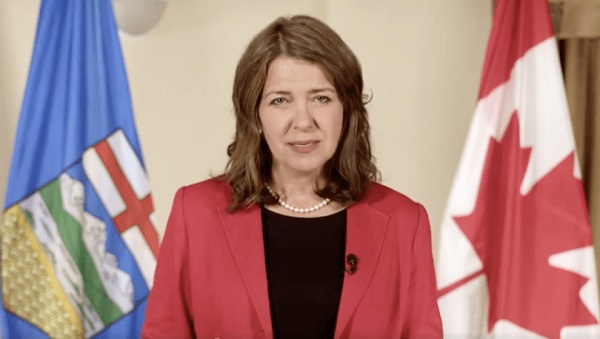Alberta
Media melts down as Danielle Smith moves to end ‘transitioning’ of children in Alberta

From LifeSiteNews
After Alberta’s Danielle Smith put forth legislation to protect kids from being gender ‘transitioned,’ the Canadian media went on a predictable melt down, citing ‘experts’ who blatantly lie to advance the LGBT agenda.
A year after announcing her intention to combat transgender ideology and protect children, Alberta Premier Danielle Smith has tabled three pieces of UCP (United Conservative Party) government legislation:
- The Education Amendment Act 2024 will require parental consent for “socially transitioning” children under the age of 16 (changing a child’s name or “preferred pronouns”). The bill also gives parents an “opt-in” option for any sexual or content at school. Smith has emphasized that the Alberta Teaching Profession Commission has the power to discipline teachers if they decide to break the law.
- The Health Statues Amendment Act 2024 will ban the use of puberty blockers and cross-sex hormones for minors, as well as prohibit sex change surgeries on minors.
- The Fairness and Safety in Sport Act will ban trans-identifying men from female sports teams.
Together, these three bills represent the most definitive pushback against gender ideology in Canada by any premier. Smith’s decision to announce her intent to pursue such legislation and then wait has turned out to be politically savvy—it has given the UCP government a good look at the LGBT response, and during that time the U.K.’s Labour government has successfully fought to maintain a similar ban in the courts and publicly rebutted many of the scare tactics used by LGBT activists.
Smith and the UCP are thus walking into this debate with eyes wide open, and are clearly certain that the public is on their side (it is) and that the legislation can survive the court challenges surely coming from LGBT activists. The policies are clearly popular with the UCP party’s base, who handed Smith a staggering 91.5% approval rating in her leadership review at UCP gathering in Red Deer last Saturday.
The party also passed 35 policy resolutions, including several that indicate the UCP’s willingness to go further in fighting transgender ideology, with resolutions that would restrict “exclusively female spaces” like bathrooms and changerooms to females and designating transgender surgeries as “elective cosmetic procedures” not funded by the taxpayer. The motions received near-unanimous support.
The Canadian press, unsurprisingly, is working hard to present policies that the vast majority of Canadians support as an attack on fundamental norms (albeit norms that only surfaced in the last few years and were never presented to voters). Global News ran the headline: “Alberta unveils 3 sweeping bills affecting trans and gender-diverse youth.” It is important to note that the press accepts the premises of transgender ideology as the starting point for their reporting, with heavy usage of nonsensical phrases like “gender-diverse youth,” which implies that there are many genders.
In fact, Global News and other Canadian outlets trotted out talking points that have been definitively rebutted by the U.K.’s Cass Review and multiple medical studies—in fact, even the New York Times has been reporting on the permanent harms of puberty blockers over the past several years. An example from Global News:
Alberta parents of gender-diverse youth like Haley Wray believe the new laws will give kids less choice — especially when it comes to health-care that is not permanent but instead, gives kids time to work through their identity struggles.
‘Hormone blockers are a very valuable tool,’ Wray said, explaining they have a very small window of effectiveness to pause, but not prevent, puberty. ‘It is reversible because nothing changes. And what that does is it allows youth and families to have that that pause, that break to explore further, validate, understand what this means and know that permanent changes aren’t happening.’
Wray believes the proposed legislation will make the province a less safe place for tens of thousands of Alberta kids who aren’t straight. It’s why, Wray says, a growing number of families with transgender children are now grappling with whether Alberta is a place they can stay. ‘I know people who have, and I know people who genuinely feel like there is likely nowhere to go,’ she said.
This is incorrect. Puberty blockers cause permanent damage, and children may be rendered permanently sterile after taking them for a relatively short period of time. Puberty is not something that can be “paused,” and it frequently causes irreversible rather than reversible damage. Smith and her government understand this, which is why they have decided to pass this legislation—not, as nearly every press outlet claimed, to “target trans youth,” but to protect them.
The CBC chimed in with sentences like this one:
Terms like ‘biological female’ and ‘biological male’ can be used to imply that transgender people are still their assigned sex at birth, despite their identity.
To translate: a scientifically accurate and precise statement is now an ideological one, but inherently ideological language invented by the transgender movement over the past decade is, in fact, technically accurate. People can identify as anything they want; it is irrelevant to their biology. The CBC presents pointing this out as some sort of propagandistic attack on vulnerable people.
Fortunately, Smith appears to know what she’s doing here. She’s taken her time to ensure that the legislation she has put forward will pass, and that it is defensible in court. Saskatchewan Premier Scott Moe, who has just led the Saskatchewan Party to its fifth straight majority government, is of a similar mind—he’s promised to put forward legislation protecting female spaces as a matter of first priority. It took long enough, but Canada’s conservatives are finally starting to move.
Alberta
Emissions Reduction Alberta offering financial boost for the next transformative drilling idea

From the Canadian Energy Centre
$35-million Alberta challenge targets next-gen drilling opportunities
‘All transformative ideas are really eligible’
Forget the old image of a straight vertical oil and gas well.
In Western Canada, engineers now steer wells for kilometres underground with remarkable precision, tapping vast energy resources from a single spot on the surface.
The sector is continually evolving as operators pursue next-generation drilling technologies that lower costs while opening new opportunities and reducing environmental impacts.
But many promising innovations never reach the market because of high development costs and limited opportunities for real-world testing, according to Emissions Reduction Alberta (ERA).
That’s why ERA is launching the Drilling Technology Challenge, which will invest up to $35 million to advance new drilling and subsurface technologies.
“The focus isn’t just on drilling, it’s about building our future economy, helping reduce emissions, creating new industries and making sure we remain a responsible leader in energy development for decades to come,” said ERA CEO Justin Riemer.
And it’s not just about oil and gas. ERA says emerging technologies can unlock new resource opportunities such as geothermal energy, deep geological CO₂ storage and critical minerals extraction.
“Alberta’s wealth comes from our natural resources, most of which are extracted through drilling and other subsurface technologies,” said Gurpreet Lail, CEO of Enserva, which represents energy service companies.
ERA funding for the challenge will range from $250,000 to $8 million per project.
Eligible technologies include advanced drilling systems, downhole tools and sensors; AI-enabled automation and optimization; low-impact rigs and fluids; geothermal and critical mineral drilling applications; and supporting infrastructure like mobile labs and simulation platforms.
“All transformative ideas are really eligible for this call,” Riemer said, noting that AI-based technologies are likely to play a growing role.
“I think what we’re seeing is that the wells of the future are going to be guided by smart sensors and real-time data. You’re going to have a lot of AI-driven controls that help operators make instant decisions and avoid problems.”
Applications for the Drilling Technology Challenge close January 29, 2026.
Alberta
New era of police accountability

The Police Review Commission (PRC) is now fully operational, giving Albertans a single, independent process to file policing complaints and ensure accountability.
Alberta’s government is putting the province at the forefront of police oversight in Canada with the creation of the PRC. This new commission replaces the current patchwork of police investigating police with one independent body responsible for receiving complaints, conducting investigations and overseeing disciplinary hearings. By centralizing these functions within a single, independent agency, Alberta is ensuring complaints are handled fairly and consistently.
“The Police Review Commission represents a new era in how Alberta addresses policing complaints. These changes are part of a broader paradigm shift where police are no longer seen as an arm of the state, but rather an extension and a reflection of the community they serve. As an independent agency, it is committed to fairness, accountability and public trust, ensuring every complaint is investigated impartially and resolved openly.”
The Police Amendment Act, 2022 laid the groundwork for this new model, establishing a modern approach to oversight built on accountability, consistency and public confidence. The PRC will manage the full complaints process from receiving and assessing, to investigating and resolving complaints related to police conduct, including serious incidents and statutory offences.
“The Alberta Association of Chiefs of Police welcomes the launch of the Police Review Commission as a meaningful step toward enhanced oversight and greater transparency in policing. By ensuring complaints are reviewed fairly and impartially, the Commission will help strengthen accountability and reinforce public trust in Alberta’s police agencies. Police leaders across the province are committed to working with the Commission and our communities to ensure every Albertan has confidence in the integrity of our police services.”
A timely and transparent complaint resolution process is essential for both the public and police. That is why the PRC must complete investigations within 180 days, and if more time is needed, the chief executive officer must publicly report on delays and provide justification. This ensures clarity, predictability and accountability throughout the process. The commission will be arm’s length from government and police services, meaning people can have greater confidence that their complaints will be investigated and resolved impartially.
“Our goal is to build trust in policing by delivering timely resolutions and fair, consistent outcomes that put people first. Every complaint will be reviewed thoroughly and handled with the transparency and respect Albertans expect and deserve.”
The PRC can also initiate systemic reviews related to police conduct or emerging trends without the need for a public complaint, and these reviews must be made public. Together, these measures create a clear, accountable process that strengthens transparency, supports continuous improvement and enhances trust in how police oversight is carried out across Alberta.
“Public safety and the confidence the public has in our police services and service members are incumbent for effective and responsible service delivery. The PRC has been developed so that Albertans may have a responsible and impartial mechanism to voice concerns regarding delivery of policing services in Alberta. I am confident that the PRC will be an inclusive and diverse representation of the communities, so we may better understand the most appropriate and effective way to respond to concerns regarding police services. I look forward to the positive outcomes for the community.”
The commission’s design was informed by engagement with Indigenous communities, law enforcement partners, municipal officials and community organizations, ensuring its structure and training reflect Alberta’s diversity and values.
Quick facts
- The PRC will handle complaints in three categories:
- Level 1: Death, serious injury and serious or sensitive allegations involving all police services in Alberta, as well as peace officer agencies.
- Level 2: Allegations of criminal and other statutory offences involving all police services in Alberta.
- Level 3: Complaints about non-criminal misconduct involving officers employed by municipal and First Nations police services.
- Complaints that fall outside the three categories will be referred to the appropriate bodies or agencies for review.
- The Alberta Serious Incident Response Team (ASIRT) will now operate under the PRC.
-

 Energy1 day ago
Energy1 day agoCanadians will soon be versed in massive West Coast LPG mega-project
-

 Alberta1 day ago
Alberta1 day agoKeynote address of Premier Danielle Smith at 2025 UCP AGM
-

 Alberta2 days ago
Alberta2 days agoNet Zero goal is a fundamental flaw in the Ottawa-Alberta MOU
-

 Food2 days ago
Food2 days agoCanada Still Serves Up Food Dyes The FDA Has Banned
-

 Addictions2 days ago
Addictions2 days agoManitoba Is Doubling Down On A Failed Drug Policy
-

 National2 days ago
National2 days agoEco-radical Canadian Cabinet minister resigns after oil deal approved
-

 COVID-192 days ago
COVID-192 days agoFDA says COVID shots ‘killed’ at least 10 children, promises new vaccine safeguards
-

 Daily Caller1 day ago
Daily Caller1 day agoTom Homan Predicts Deportation Of Most Third World Migrants Over Risks From Screening Docs





